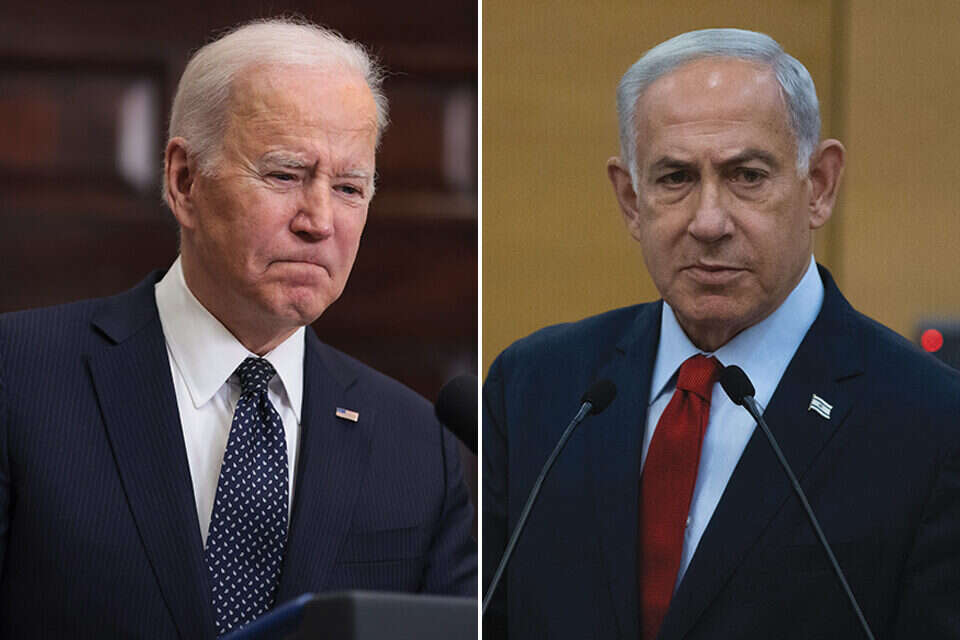Six decades ago, Israel became a de facto strategic partner of President John F. Kennedy's administration. The Hawk missile deal, signed in 1962, paved the way for the expansion, upgrading and systematic strengthening of the security ties between Washington and Jerusalem. At its current peak, this mask includes not only the annual aid package totaling $3.8 billion, which is ready for Israel until 2028, but also a rich and diverse range of cooperation in the technological, intelligence, and operational spheres, including joint military exercises and periodic situation assessments.
Alongside this flourishing of the strategic axis in the partnership, the second layer, which makes up the relationship, has so far been preserved (although eroded by its margins), which has provided Israel with a solid safety net and an insurance policy for a rainy day. This is the moral dimension of the alliance, which was anchored from its inception in the widespread feeling among broad American publics, according to which the Zionist enterprise is a purely crystalline reflection of the founding ethos, history, and heritage of its friend overseas.
There have been serious controversies in the past as well
According to this view of the "special relationship," the State of Israel, just like its elder sister, is a high and lofty democratic beacon, spreading its light and warmth the lofty principles of equality, tolerance and liberty that have shaped, at least in theory, the cultural and regime narrative of the American nation.
Herzog prays at Congress for the return of prisoners and missing persons // Photo: GPO
The current crisis between President Biden and Prime Minister Netanyahu, which has burst to the surface in all its severity in recent months, tangibly threatens to unravel this dual infrastructure of support, and especially to erode the "terms of affection" that constituted the moral, normative and ideological anchor of this unique partnership.
Indeed, since last March until today, we have witnessed a direct and declared link, even from the president himself, between the two traditional pillars of the alliance. As Biden put it, both in his conversation yesterday with his guest, President Herzog, and in the subsequent briefing he gave to his close associate Thomas Friedman (assuming, of course, that the senior journalist's version of the conversation is reliable and accurate), if the legal reform is indeed implemented without broad national consensus, thereby threatening the character and stability of the existing democratic order, the administration will find it difficult to mobilize vigorous action in the Gulf arena with the aim of expanding the Abraham Accords (with an emphasis on Saudi Arabia's integration into them).
Netanyahu and Biden in better days, photo: Raanan Cohen
In other words, if there is indeed a deviation from traditional contours of Israeli political culture, the United States cannot be expected to employ powerful levers of influence (such as promoting advanced arms deals with Saudi Arabia) in order to subsidize regional normalization processes.
The collapse of the ideological component
The inevitable outcome of this is destined to be a deep tectonic rift, since the collapse of the ideological component that gave the Alliance a hermetic defensive wall will leave the strategic dimension exposed in the turret and vulnerable, if not necessarily in the short term.
Against this challenging background, the Israeli president's festive visit to Washington further illustrates the depth of the rift between Biden and Netanyahu (despite the conciliatory tone that ostensibly characterized their telephone conversation this week). Indeed, while a fog of ambiguity continues to envelop the issue of the timing and location of the prime minister's visit to the United States, it is hard to ignore the gap that exists between the warmth showered on President Herzog from all sides and the chill blowing from the direction of "all the president's men" towards the current coalition and its legislative initiatives (as well as its conduct in the Palestinian arena).
Herzog. 'Israel is a strong democratic country', Photo: GettyImages
Herzog at Congress, Photo: Reuters
Herzog's speech yesterday to both houses of Congress further illustrates and amplifies this contrasting parallel. While some members of the Democratic faction in Congress boycotted the session in which Netanyahu gave a defiant and confrontational speech against President Barack Obama in 2015 in a desperate effort to thwart the nuclear agreement with Iran, Herzog found himself enveloped in a powerful wave of affection, sympathy and overwhelming support that crossed party lines.
It was a warm-filled reception, expressed repeatedly in the prolonged applause that promoted every statement and title of the speech, which repeatedly emphasized the moral, cultural and historical connection that connects and bridges the two nations.
The question is whether this picture of a tectonic rift between the political vertices of the alliance, in connection with its normative-value dimension, will gradually penetrate the strategic space as well, thereby creating a new situation full of uncertainty and risks for Israel? Time will tell.
Prof. Avraham Ben-Zvi and his partner, Dr. Gadi Warsaw, recently published the book: "Knocking on Every Door: Israel's Foreign Policy, 1948-2018", Lambda Publishing, Open University Books, 475 pp.
Wrong? We'll fix it! If you find a mistake in the article, please share with us

